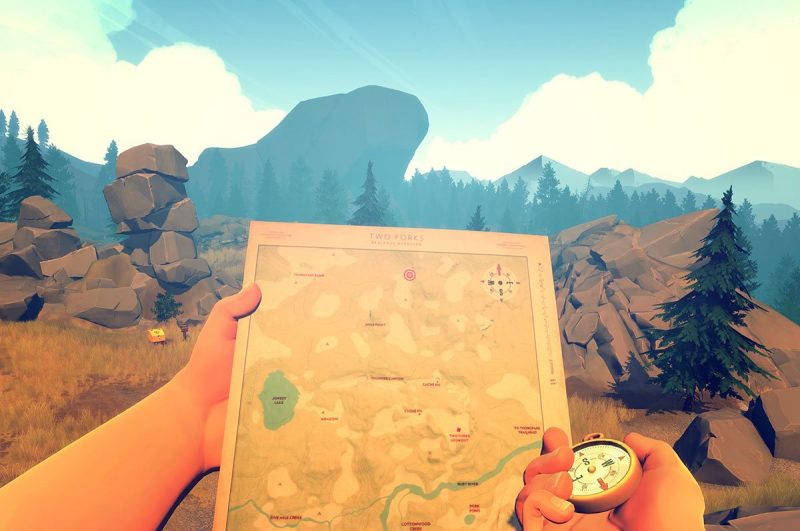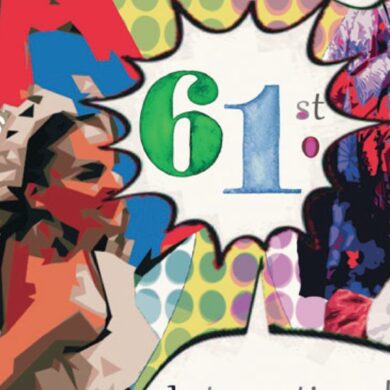by Rae Ann Fera
Central photo: Video games such as the first-person Firewatch are full of narrative depth and layers and are well-suited to literary analysis.
A growing group of university profs and writers is looking at today’s most popular form of entertainment with a critical eye
According to stereotype, English majors are the ones on campus sitting in a corner with their face buried in a novel. But students of Lawrence Switzky’s upcoming ENG279H5S at the University of Toronto will be the ones clutching a game controller.
That’s because in Switzky’s class, Video Games, students won’t study Austen or Hemingway. Instead, they’ll dissect the stories of games like Spec Ops: The Line or Depression Quest.
Video games have been the subject of academic study since the early 2000s where scholars and lecturers primarily analyzed games in terms of gameplay, immersion or player agency.
But now a growing group of academics are applying well-established methods of literary critique to today’s most popular form of entertainment. But not everyone agrees that games should be treated like literature.
For Switzky, an assistant professor in U of T’s English department, the inciting incident for his course – which started as a fourth-year seminar but is being launched as a second-year lecture course in spring 2018 – came when he asked what his students were reading.
“If you ask a group of students if they’ve read a novel by Dickens or George Eliot, you get a few hands raised,” he says. “Whereas if you asked them about video games, they have all kinds of references. I was interested in teaching a class where the students would have almost too much knowledge of the subject matter but not necessarily a critical attitude.”
As Switzky and other academics are discovering, there’s a lot to be gained by putting games and literature side by side and looking at the similarities and differences.
In his class, studying video games will encompass materials that have informed game theory, such as the work of Jorge Luis Borges, some literary texts and games. Lots of games.
The work of Borges, he says, has incredible parallels with today’s technology. For instance, Library Of Babel, a short story about a place where all knowledge was stored, has become analogous with the internet.
Switzky favours game narratives that involve moral choice and connection with character such as Hush, Proteus, Thomas Was Alone and Spec Ops: The Line. One of his favourite games, What Remains Of Edith Finch, is not taught in class due to the onerous hardware demands (he sticks to shorter, indie games so they’re accessible and not too time-intensive), but is representative of the power of game narratives.
The game is a collection of magical realist stories where you have find out how each member of the Finch family died. It sounds incredibly morbid, but is actually awe-inspiring.
“I don’t often cry at games but this is one that did it for me,” he says.
In 2010, Cindy Poremba developed a video games critique course at Concordia University. She asked: “What if there were an English course where the texts were games?”
“If you’re going to critique something, then English is a pretty good place to start because the methodologies are all based on looking thoroughly at a text, breaking it down, trying to understand it and figure out the layers of meaning,” she says over the phone from OCAD University, where she is now assistant professor for digital entertainment in the Digital Futures department.
Poremba encourages students to approach a text critically through close reading. She says games such as Her Story, Gone Home or Firewatch are designed with narrative depth and layers, and thus well suited to literary critique, as is Tale Of Tales, an eerie take on Little Red Riding Hood.
Both professors have students look at novels, poems and short stories through the lens of game mechanics.
Poremba had Italo Calvino’s If On A Winter’s Night A Traveler on the syllabus, which is written in the second person. “That’s almost never done in literature,” she says. “That’s kind of equivalent to the first person in games so we looked at it as a first-person text.”
She also had her class look at Borges’s short stories and create game treatments out of them, which then forced students to figure out the mechanics of the story.

The Borderlands franchise is the subject of Kaitlin Tremblay’s book Ain’t No Place For A Hero: Borderlands.
It’s not just academics who are engaging in literary critiques of games.
Author Kaitlin Tremblay’s book Ain’t No Place For A Hero: Borderlands is a thorough and thoughtful critique of what some consider to be a super-gory and sort of silly (and very popular) first-person shooter.
She was first drawn to Borderlands due to it’s crass humour and over-the-top action. But fresh off her master’s degree in English and Film, she soon found herself absorbed in the human emotion of the game.
“As soon as I came to see video games as a piece of media, it really opened up my eyes about what games were doing, beyond the video game mechanics,” she says. “Why not give them the same attention I’d give books?”
She believes that in games, as in other forms of storytelling, there is an attempt to make a connection. “It’s just people trying to share something about how they feel. Ultimately, it’s the root of all narrative, regardless of media.”
However, not everyone believes that games are analogous to other literary works.
Matthew Payne, assistant professor, at the University of Notre Dame’s film, television and theatre department says there is value in studying games in the way there is value in studying film and literature, but that doesn’t mean the approach should be the same.
“It’s true that film, literature and games all can tell stories, yet they do so in different ways,” he says. “Video games shouldn’t be taught like literature if that means that we’re simply swapping out Moby Dick for Half-Life, or replacing 1984 with Super Mario Bros.”
Even Switzky doesn’t actually believe games are literature, rather that “there are features that games share with literature and other forms of storytelling media.”
Another critique of casting a literary light on video games is that often, specifically in the first-person shooter realm, story is not the point. Switzky admits his students have voiced this opinion.
On this matter Payne disagrees.
“There’s no reason that a first-person shooter couldn’t be assessed as a narrative text,” he says. Payne is also the author of Playing War: Military Video Games After 9/11 and has specialized in the academic understanding of war games.
While it’s true that in many shooters storytelling takes a backseat to head-to-head competition, he explains, multiplayer titles like Doom and Halo are engrossing, while others, like Call Of Duty: WWII and Battlefield 1 bring historical events into the gameplay.
“Shooters communicate underlying cultural beliefs and reigning political mythologies about why nations fight,” he argues. “It is imperative that we take these interactive stories seriously and that we appreciate what their design strategies say about the efficacy of warfare and the political mythologies that allow nations to wield lethal power.
“Appreciating the sophistication (or lack thereof) of narrative gameplay is critical to understanding why something as objectively horrifying as war can be transformed into an exciting and pleasurable video game,” he adds.
And that’s where the two media perfectly intertwine. By using tools to understand story, games are able to be understood in a human context.
“We do a disservice to our own understanding of ourselves if we ignore this medium that people are choosing to explore,” says Tremblay. “To ignore video games is to ignore the next epoch of how we tell stories and how we share.”




